‘Stand Up Planet’: Hasan Minhaj Follows the Funny Around the Globe
Hasan Minhaj wants everyone to see “Stand Up Planet.” But that’s not because he’s the host -- Minhaj believes the documentary shows how comedy can change the world a joke at a time. Hasan Minhaj wants everyone to see “Stand Up Planet.” But that’s not because he’s the host—Minhaj believes the documentary shows how comedy can change the world a joke at a time.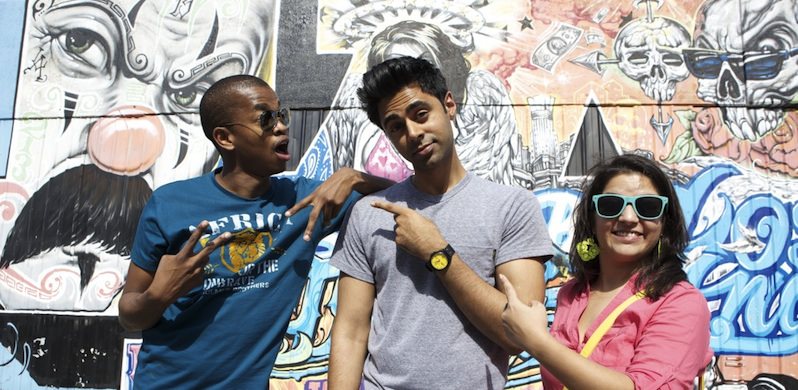 South African comic Mpho “Popps” Modikoane, host Hasan Minhaj and Aditi Mittal team up in Los Angeles' Skid Row in this publicity still from "Stand Up Planet." standupplanet.org
South African comic Mpho “Popps” Modikoane, host Hasan Minhaj and Aditi Mittal team up in Los Angeles' Skid Row in this publicity still from "Stand Up Planet." standupplanet.org
Hasan Minhaj wants everyone to see “Stand Up Planet.” But that’s not because he’s the host — Minhaj believes the documentary shows how comedy can change the world a joke at a time.
In “Stand Up Planet,” he travels to Mumbai, India, and Johannesburg, South Africa, to see how comedians there take on topics such as economic inequality, women’s rights, and race and make them funny. The cameras follow the comedians in their home cities, showing how they deal with the issues they joke about, such as losing family members to AIDS.
“Stand Up Planet,” which airs simultaneously Wednesday on Link TV and Pivot at 7 p.m. EST and on KCET at 9 p.m. PST, boasts an impressive list of advisers, including comedic superstars Bill Cosby, Norman Lear and Carl Reiner. Minhaj appeared on the latest season of “Arrested Development,” hosts MTV’s Thursday night talk show “Failosophy” and has a viral Web series “The Truth with Hasan Minhaj.” He caught a showing of “Stand Up Planet” at the San Francisco International Film Festival in April and talked with Truthdig about how funny is funny no matter the culture, how joking about HIV can alleviate shame and relieve tension, and how laughter is an expression of love.
Emily Wilson: How did you get involved with this project?
Hasan Minhaj: I was doing all this autobiographical stuff about my family and being a first-generation immigrant from India and going back to India and visiting cousins and seeing what my narrative would be like if I were placed in their shoes. I think that’s one of the craziest things about being a first generation — you have that immediate look at what your life would be if you were in India, and this is what your life is like now in America, and you have to reconcile those and make your own identity. I had this joke where I said I feel like the rapper that made it. I’m like, “All right man, Gushers on me — whatever you want, I got you. When Hasan’s here, everybody eats!”
Stand-up is one of those unique mediums in which, as the court jester on stage, we can talk about what’s really happening — but at the end of the day, it’s OK because it’s just a joke. So we can speak the truth but are protected by the joke. So they thought there’s a lot of comics about the world speaking truths about economic and social justice and poverty and women’s rights and apartheid — all this amazing stuff is happening, and they’re able to do it and get away with it because they’re being funny.
“Stand Up Planet” was about following the narrative into their lives, and it was really cool for me to do this Anthony Bourdain “No Reservations” type of thing where we are adding pages to the human narrative. When I went to South Africa, people were talking about losing loved ones to HIV and AIDS and being funny about it. There’s this great comic I met in South Africa, Mpho Popps, who had this amazing story about how his uncle passed away from AIDS. He tells this hilarious story about the lengths his uncle went to to cover it up from his family. Then when the cameras go into the house, and you meet his grandma and see the bedroom the uncle passed away in, you’re like, “Oh, this is real.” As a comedian, it was the most enriching experience of my life. I feel so lucky to have been chosen to be a part of this.
EW: Do you think comedy comes out of struggle?
HM: I think comedy does come from struggle, but there are different shades of struggle. It can be about your family or traumatic events in your life or comedy can be about your own internal struggle. Like Woody Allen’s obsession with death — is that something someone imposed on him or something he imposed on himself? Eddie Murphy, his father was murdered. Richard Pryor grew up in a brothel. So those are traumatic events.
EW: How did you decide on India and South Africa?
HM: There were so many countries they wanted to hit. We take it for granted that we export our entertainment and pop culture. We export Justin Timberlake and “Transformers.” It’s an amazing thing that now a lot of English-speaking countries and countries like Brazil and Nigeria and India have a booming stand-up comedy scene where they’re applying comedy to their own reality, talking about women’s rights and apartheid and oppression in their own way.
You could not do certain things here that they do there. We were in South Africa performing, and these guys are talking about the injustices of apartheid, and the Afrikaans audience is laughing. I thought, “Wow, this wound couldn’t be fresher, and the oppressed and the oppressors are laughing together.” I applauded that.
I wish American comics were a little more open to what they have to offer because in South Africa their dialogue about race and race relations is great. We have something to learn from them there. And in India their fearlessness to talk about injustice, not only in their country, but in a lot of other countries, is really great.
EW: How did Bill Cosby get involved?
HM: He was an adviser to the project — he’s very passionate about this. One of the things Bill Cosby kept saying over and over was, “Funny is funny.” I just didn’t understand that — it seemed like the vaguest thing ever. Then when you watch the doc, and you see people like Loyiso Gola in South Africa, and he’s doing references about Zulu and tribes and things totally outside my experience, and you laugh, and it’s like, yeah, funny is funny. There’s something transcendent about comedy, much like music. There’s a rhythm and pace to it. You can just tell when someone is funny. EW: What tangible results do you hope will come out of this?
HM: A lot of the things you promote are about you or the project, like “Watch my movie,” or “Watch the premiere of my show.” What made me excited about this project was starting this dialogue. This isn’t about me or Bill Cosby or Norman Lear or Carl Reiner — it’s about the culture of comedy as a whole and that they need a chapter added to the book of global comedy. They’re adding to the narrative of comedy. It’s so important to share these people’s stories. We got to interview Bill Cosby at his house, and I was so grateful for the gems he was sharing. He was talking about bombing and how you bomb on your own terms — that’s transcendent type of stuff. You can apply that to your own life. He’s going to go up there and be him and convey his thoughts and ideas as clearly as possible.
EW: Why do you think comedy is an effective way to communicate about social problems?
HM: The comedian is like the champion of the people. It’s almost like we’re thought collectors, along with our own point of view. And what’s great about it is we don’t have to toe any lines or protect any institutions. You can look at an issue and comedy is a powerful tool. I do believe laughter is an expression of love. It’s an expression of joy.
Ultimately, I want to help people, and I want to help them experience joy. That’s really what the power of comedy is. I was on the plane and I saw this huge dude, very muscular, probably 6’4” with traps that connected to his ears, and he was watching “Up.” And he was crying. It was amazing that this cartoon that has a man with a square face is evoking this level of emotion. That is powerful. What he was experiencing in a very visceral way was joy and love and sadness and humanity. Comedy has the potential to do that, too. The great comedians, the really great ones, take it beyond clever tweets and quips and yuks and make it something so much bigger. They’re not using metaphors or similes, they’re using their own lives, and that’s really cool.
Your support matters…Independent journalism is under threat and overshadowed by heavily funded mainstream media.
You can help level the playing field. Become a member.
Your tax-deductible contribution keeps us digging beneath the headlines to give you thought-provoking, investigative reporting and analysis that unearths what's really happening- without compromise.
Give today to support our courageous, independent journalists.

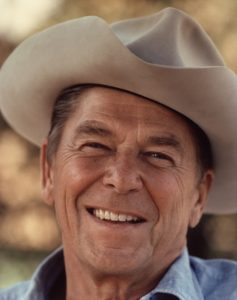
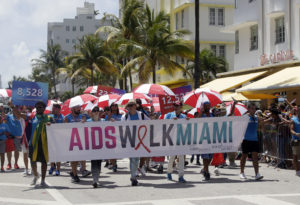
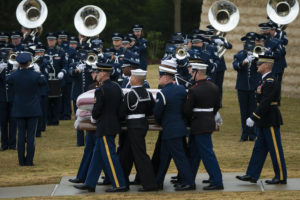
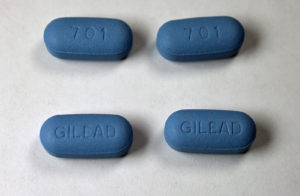
You need to be a supporter to comment.
There are currently no responses to this article.
Be the first to respond.